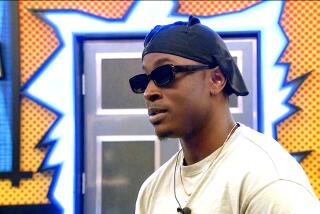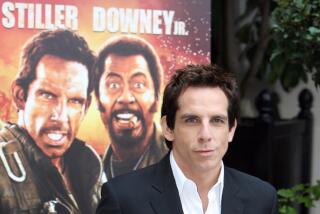Dictionary’s Stance on ‘N-Word’ May Mark Defining Moment
WASHINGTON — Merriam-Webster defines the word “nigger” as, simply, a “black person.”
Not so, says an ad hoc coalition of civil rights and black activists, who argue that the “N-word” actually is a defamatory slur associated with black people--not a broadly sweeping noun synonymous with them.
This sort of etymological debate typically rages within a self-contained community of wordsmiths laboring unseen and little noticed on college campuses or at major publishing houses. Rarely does it explode into public view.
But as American society swells with more and louder voices of a polyglot nation, language has become one more battleground for fierce clashes of authority, multicultural expression, freedom of speech and marketplace sovereignty.
Even dictionaries disagree. The nation’s four best-selling college-level dictionaries--Merriam-Webster, Webster’s New World, American Heritage and Random House--each offer slightly differing definitions of the N-word.
So, too, for offensive terms used derogatorily to refer to Italians, Latinos, Jews and gays.
So, who can definitively say what any word means?
*
“There are no easy answers,” said Paul Dixon, a freelance editor for Merriam-Webster and author of several books on writing and language usage. “There are two groups of people who lay claim to language. One group says language is owned by the authorities--people who prescribe it, who protect it and act as its custodians.
“The other group says language is owned by the people who use it and are affected by it. That’s where the debate is.”
By most measures, Delphine Abraham, a 37-year-old black woman from Ypsilanti, Mich., is the most unlikely entrant into this battle over words. A computer technician not at a loss for words, Abraham thumbed through the 10th Collegiate Edition of the Merriam-Webster Dictionary and was stunned to find, on page 784, halfway down the first column, a surprising definition: “1. a black person, usu. taken to be offensive.”
“I couldn’t believe it,” she said. “The next morning I called the president of Merriam-Webster to complain.
“I told him that definition was wrong. A nigger isn’t a black person; it’s a derogatory term used to dehumanize a group of people.”
The folks at Merriam-Webster were unmoved. So she began a word-of-mouth, letter-writing, e-mail campaign.
*
Abraham does not argue that the word should be stripped from the dictionary. She does not even argue that it should be censored from speech.
Her view is simple, if nuanced: a nigger is not a black person, it is a derogatory slur used to describe black people, usually by bigots. Letting bigots have the final say on how she and other black people are defined is what galls her most.
Abraham’s campaign, which has attracted international attention and support from politicians and civil rights activists, is likely to generate more support from other ethnic and racial groups. She predicts that by 2000 she will have focused enough public pressure on dictionary publishers that they will redefine many words that label ethnic, religious and racial minorities.
“It’s not just the N-word,” she said. “I think [lexicographers] should make it clear these words are slurs, not people.”
Given the nation’s changing racial, religious and ethnic complexion, Abraham’s discovery raises a broader question about language. In a nation of many sensibilities, who owns words?
“As you get more and more into a sensitive society, you have to stretch the definition of a definition,” said Justin Kaplan, a prominent writer and editor of Bartlett’s Quotations. “I don’t mind that. But a dictionary has a certain intellectual responsibility. You can’t bend to everybody’s preferences.”
Abraham is not the first to protest language as racial or ethnic slur. In 1994, the Anti-Defamation League took umbrage at the use of “jew” as a verb in the Official Scrabble Player’s Dictionary. In a letter to Hasbro Inc., the company that owns Scrabble-maker Milton-Bradley, the Jewish group said the game-maker’s inclusion of “offensive terms . . . is literally playing games with hate.”
John D. Williams Jr., executive director of the National Scrabble Assn., said the complaint led to a reexamination of the dictionary and the removal of 150 words deemed offensive because of their racial, religious, sexual or vulgar overtones. While the words aren’t in the Scrabble dictionary, they are still used in some tournaments and can be found on Internet bulletin boards.
“Context is the key,” said Williams, who continues to lecture and write about how words function in real-life situations. “To a white person living in the rural South during the 1950s, calling someone a nigger wasn’t a slur. It was a statement of fact, a way of describing who might be coming to drop off a package. But to the black man who hears it, it has another meaning. It’s offensive, and it hurts. I don’t know that a rigid definition on a page can contain both ideas to the satisfaction of everyone.”
The Anti-Defamation League’s letter swayed the keepers of the Scrabble board. Now, in the case of the dictionary publisher, the National Assn. for the Advancement of Colored People hopes to do the same.
*
“We believe the word ‘nigger’ should not be defined as synonymous with a black, Negro or member of a socially disadvantaged class of person,” said Kweisi Mfume, the NAACP’s executive director and chief executive.
Initially, executives and lexicographers at Merriam-Webster dismissed the complaints. They had monitored journals and publications, tracked words and their meanings, and compiled them in a carefully formatted dictionary.
But Abraham’s plaint struck a chord. “This issue has been burning up my e-mail,” said Barbara Arnwine, executive director of the Washington-based Lawyers Committee on Civil Rights. “I am amazed that this subject has touched such a nerve among African Americans who feel they are being defined by other people.”
As more and more petitions--fed by Internet traffic and black talk-radio discussions--flooded into its Springfield, Mass., headquarters, Merriam-Webster announced it would act.
After consulting a group of 12 in-house editors and outside scholars, the dictionary decided to retain the first definition, the one that offended Abraham, because of its policy to list first the oldest usage of the word in the English language.
But bowing to the avalanche of complaining missives, the editors agreed to add a more prominent “usage warning” before the definition of the N-word and about 200 other words that might be viewed as offensive.
Defending the decision, Deborah Burns, director of marketing for Merriam-Webster, said Abraham’s complaints were heartfelt but uninformed.
“I think she has her own opinion about how she would write the definition, if she were a lexicographer,” Burns said. “That’s different from what this group of senior editors and scholars would say in determining what should go in a dictionary.”
*
Asked if the decision is final, Burns said: “It will not be changed in the near future. This is pretty much a closed case.”
But NAACP officials say they will press on, possibly calling for a boycott of the publisher and looking into the company’s record on hiring minorities, purchases from minority vendors and the racial composition of its board of directors.
“What they say they are going to do is unacceptable,” Mfume said. “We are going to fight them on this until hell freezes over.”
Or, as Abraham put it: “I don’t think a group of white males can get together and decide this. They don’t know or care that their decision is used to dehumanize a group of people. It’s not them being victimized by the words they put in the dictionary.”
More to Read
Sign up for our Book Club newsletter
Get the latest news, events and more from the Los Angeles Times Book Club, and help us get L.A. reading and talking.
You may occasionally receive promotional content from the Los Angeles Times.








